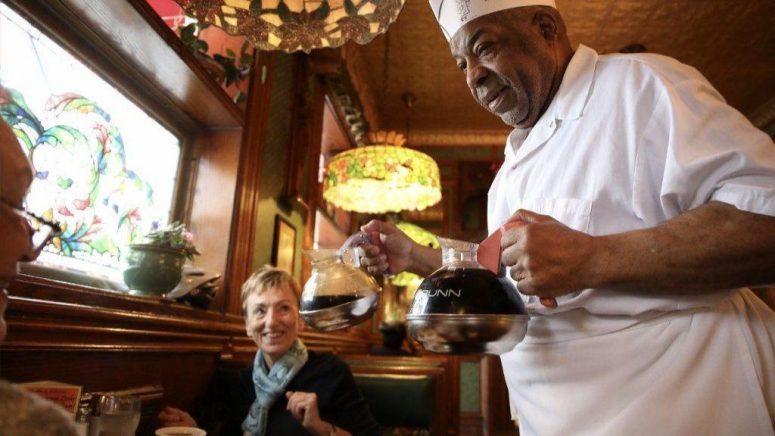Having little ambition and earning an entry-level income for life is not an injustice

Courtesy Chicago Tribune
I read a thought-provoking story recently about Othea Loggan, a Chicago man who has bussed tables at the same restaurant for 54 years. He still works there today, earning just under $3 more per hour than minimum wage. With tips and annual bonuses, it’s estimated Loggan earns $14 an hour bussing the same tables he has for over five decades.
Unlike most entry-level bussers, Loggan gets five weeks vacation per year and works at a place he seems to really enjoy. Like every other busser, he gets no retirement or health insurance, however.
Despite all of this, Loggan (and his full-time working wife) raised a family, bought a house, and is seemingly happy, or at least he isn’t verbal about expressing any regrets. In fact, his son says as much. “My father is old school — never complains about nothing, never. My mother too. There were times it was hard to get food on the table, and they did not complain. But he got this job, he did it well, held on to it, and there needs to be a lot of respect for someone like that.”
The chef that has worked with Loggan for more than five decades says the same. “I think Loggan just decided to be a busboy. He is content. It’s all he wants. So I ask — isn’t that OK?”
It’s not okay, implies author Chris Borrelli. Loggan should get paid more for his loyalty, the former undertones. He shouldn’t accept hand-me-downs from his stingy employer. He is a victim of unchecked capitalism. Despite sticking to an entry-level job, Loggan should get benefits in addition to a raise. He should be unhappy and ungrateful—never mind what he, his family, his coworkers, or his mostly affluent customers say.
The narrative is one that’s often found in liberal-leaning media. We as a society should be upset, even if the people that are directly involved in such “injustices” aren’t necessarily. The wonderful New York Times, my otherwise favorite and most respected newspaper, published similar things this week after saying that “Nobody in America should be poor, period”—regardless of their education, work ethic, or even free will (aka universal basic income).
My take: Deciding for others is not freedom, even if it may be in their best interest. We don’t get to project our values onto others, be them liberal or conservative. Even if we don’t like it, even if we think it’s unfair, we must respect an individual’s right to choose, so long as it doesn’t infringe upon the rights of another.
That goes for poverty and low ambition as much as it does freedom of speech and religion.
By the same token, we shouldn’t be greedy, scorched-earth capitalists. We should be forgiving, understanding, empathetic towards underprivileged people, and respectful of the hand-outs we’ve each received as citizens of this life-giving, resource-rich planet. In doing so, we’re better able to assist others, encourage them, and serve them without judging them for choosing a different path (or making different mistakes) than we have.
Can I get a witness?
DISCOLSURE: As an unregistered libertarian living in the beautiful fly-over state of Utah, I vote republican 50% of the time, democrat 40% of the time, and libertarian 10% of the time. I identify as a fiscal conservative and social liberal, believe in temporary and contingent-based safety nets, and think people do more to help others when they take it upon themselves, rather than deferring to the state to fix society’s problems.
